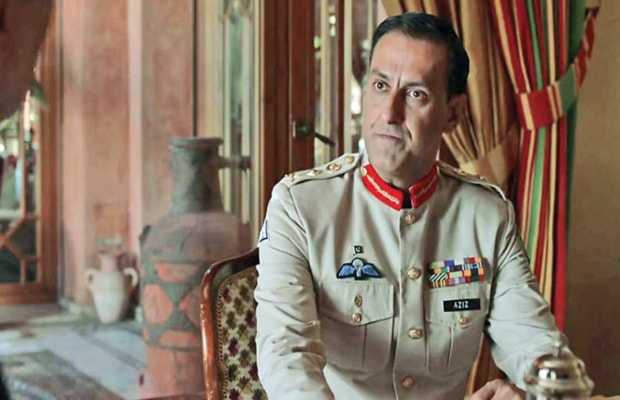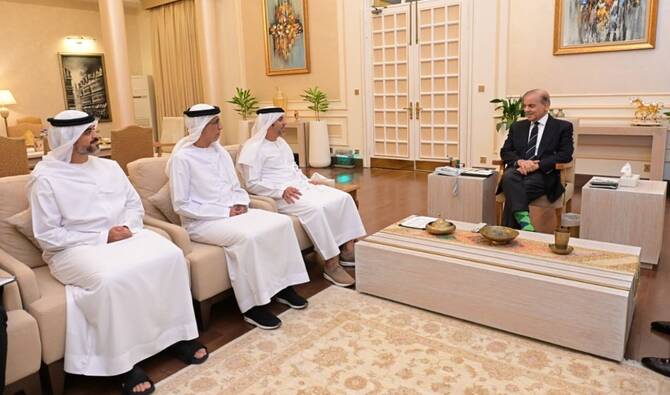KARACHI: Pakistani fans of American spy thriller series “Homeland” had in its last season a special reason to rejoice, as the production featured Pakistani star Adnan Jaffar. The actor known from “Parwaaz Hai Junoon” shared with Arab News some moments from his recent Hollywood experience.
“I was contacted by a casting agency last year in May, through WhatApp,” Jaffar recalled, “They asked me to record a few lines and send them back for audition. In the beginning, I thought it was a prank, but later, after giving it a second thought, I sent them my video.”
A few weeks, the agency got back to him. “I was really amazed when I was told that I had been selected for the role of a Major Aziz. Then in the last week of June I traveled to Casablanca, the largest city of Morocco, for four days,” he said. The set in Casablanca was built to act as Rawalpindi.

A screenshot from "Homeland" shows Adnan Jaffar playing Pakistani officer Aziz.
Jaffar appears in the ninth episode of the series eighth, playing Pakistani officer Aziz. What is important, he said, is that for the first time a Hollywood production took a Pakistani actor to play a Pakistani character. Usually, roles that originate as Pakistani characters end up going to Indian actors. Even in “Homeland” itself, Pakistani intelligence agent Tasneem Quraishi is played by Indian actor Nimrat Kaur.
Jaffar has earned fame through theater, television and film productions. He played an air force pilot in “Parwaaz Hai Junoon” (2018) and a navy admiral in “Laal,” a telefilm available on Amazon Prime. His other two Pakistani films — “Intezaar” and “Money Back Guarantee,” where he appears along Fawad Khan — are ready but their release has been postponed due to the coronavirus outbreak.
Jaffar’s “Homeland” role is of additional importance at home, as its earlier episodes were seen as quite controversial due to their often biased portrayal of Muslims and Pakistanis.
Jaffar said he had inquired about the nature of his role before he agreed to take it. He wanted to make sure it would not contribute to giving his country a bad name.
The spy thriller series, produced by Fo21 Television Studios and aired on Showtime, started in October 2011. Its main character, Carrie Mathison — played by Claire Danes — is a CIA officer on covert missions across the world.
In his “Homeland” debut, Jaffar appears with British-Pakistani actor Art Malik, who played a retired Pakistani official. They rehearsed the scene on the same day it was shot. Everything went smoothly and it was recorded in just four takes.
“We sat together and discussed our scene, scrutinized it and memorized our lines,” Jaffar said, “I was already very overwhelmed by going there and was very cautious and observant too that how they were going about things but at the same time, the production team and other staff were also very encouraging and supportive. They are extremely professional.”
Working with the “Homeland” crew was wonderful, Jaffar told Arab News.
“It is a fact that they are in a very resourceful industry and treat all their cast and staff very well, as they want the best out of them, but it was beyond my expectation. They accommodated me in a plush hotel and provided with a chauffeur driving a Mercedes car for my entire four days there. I was given a vanity van only for my six-hour shot.”
The Hollywood experience on the set in Morocco made Jaffar think that Pakistan with its picturesque tourist destinations should also consider opening up for foreign film crews. This would also help develop the industry at home, giving opportunities to local artists and film students.
“I saw during the shoot in Morocco that many local students, who were studying film, were there on set to learn film making through practice.”
When he started his acting career, Jaffar never thought he would work for a Hollywood team. While he does not know if similar opportunities will come his way in the future, he said he hopes the “Homeland” role will somehow pave the way for Pakistani artists into the international film industry.















